When All the Options are Bad
The day before I found out Honey had cancer, I had emptied the front porch of furniture and washed it. The forecast called for dry and fair and sunny all week, and I planned on conducting a white-washing of the railing and an orchestrating of staining the floorboards a fresh coat of Bison Red.
That Tuesday morning, I was going to take Honey to the vet for her 9:30 appointment, find out that her loss of appetite was something benign like old age or finickyness, then come home and paint all afternoon.
At the vet, we first spoke about things like: Perhaps the lack of diet was the result of a sore tooth. Then the vet felt her stomach and he said he felt a mass. But not to worry: It might just be a benign mass on the spleen, which is common, and we can take that out no problem. They did x-rays and they confirmed masses, but it seemed like the masses could be elsewhere other than the spleen, and that would be less good. They needed an ultrasound to confirm.
She was held for an ultrasound at noon, during which time I got coffee with Rothko and sat outside in the cool air and the hot sun and texted my person in DC. We joked via text that Honey was too tough for cancer. We talked about how cancer would take one look at Honey and be like, Fuck this, I’m not holing up here.
I went home. At home, I scrolled some things online. Mindless. Nothing. The vet’s office called me back to tell me I could get Honey and while they didn’t say anything, I could tell it wasn’t good. At the office, the vet confirmed non-goodness. It was the first time he had not been positive. There was the mass on her spleen, but also masses on all the lobes of her liver and that made surgery not an option.
He explained what the options were and none of them had good outcomes if you are to use the word “good” to mean “survival.”
One of the options was to put Honey down soon, like in the next day or two, before she bled out and experienced a lot of pain.
I told the vet that Honey was my first dog and my baby.
And that was the first time I cried.
***
The “Treachery of Photography” and the Sadness of Forgetting
I’ve started reading Sally Mann’s really wonderful memoir Hold Still. Based on what I’ve read so far, I would highly recommend it, especially to my W&L friends. I may be biased, because not only do I relate to Sally Mann as somebody who takes a lot of photographs, but I also have a fondness and knowledge of her birth town, Lexington, Virginia, where I went to college and spent four years of my life. She talks a lot about that town in the book, along with the larger area of Rockbridge County. She dispels rumors (or does she?) that Edward Albee drew inspiration for Who’s Afraid of Virginia Wolfe from one of my college professors and his wife. Already in the first couple dozen pages there are heavy doses of Southern Gothic story mixed with philosophical thoughts on memory and the nature of our human artifacts. And, of course, photography. Bottom line: It’s good. I dig it.
In the prologue, titled “The Meuse,” (and if you like words, you should look this one up) she writes elegantly on memory and “truth,” two things I’ve been thinking a lot about as I’ve been writing stories about my childhood.
Here are a great couple of lines:
I tend to agree with the theory that if you want to keep a memory pristine, you must not call upon it too often, for each time it is revisited, you alter it irrevocably, remembering not the original impression left by experience but the last time you recalled it. With tiny differences creeping in at each cycle, the exercise of our memory does not bring us closer to the past but draws us farther away.
I’ve learned by listening to a RadioLab podcast on memory that neuroscientists have done research to prove this exact thing: the purest memories are perhaps the ones we’ve never remembered. In truth, we’re not accessing some repository of memories when we “remember” something, we’re actually creating the memory from scratch each time we remember it, and that act of creation is also an act of destruction.
Mann takes this idea into the realm of photography:
So, before I scissored the ancestral boxes, I opened my own to check my erratic remembrance against the artifacts they held, and in doing so encountered the malignant twin to imperfect memory: the treachery of photography. As far back as 1901 Emile Zola telegraphed the threat of this relatively new medium, remarking that you cannot claim to have really seen something until you have photographed it. What Zola perhaps also knew or intuited was that once photographed, whatever you had “really seen” would never be seen by the eye of memory again. It would forever be cut from the continuum of being, a mere sliver, a slight, translucent paring from the fat life of time; elegiac, one-dimensional, immediately assuming the amber quality of nostalgia: an instantaneous memento mori. Photography would seem to preserve our past and make it invulnerable to the distortions of repeated memorial superimpositions, but I think that is a fallacy: photographs supplant and corrupt the past, all the while creating their own memories. As I held my childhood pictures in my hands, in the tenderness of my “remembering,” I also knew that with each photograph I was forgetting.
I am not exaggerating when I say that I have taken tens of thousands of photographs of Honey. As I go back through them, I am struck with a sadness. I thought it was a sadness of remembering. But I also felt like that didn’t quite explain it somehow. It didn’t explain why I was so reluctant to look at those photos of her. It seemed more complicated than that.
Here’s why: It wasn’t a sadness of remembering. It was a sadness of forgetting.
All these photographs I’ve taken of Honey have been to “preserve” something. A spirit. A feeling. And the sad, terrible — indeed “treacherous” — thing is that as I go about looking at these artifacts, they feel like they’re having the reverse effect. Instead of bringing those feelings back to me, I feel like they’re moving them further away. Instead of recreating those memories for me, I feel like they’re destroying them.
***
Everything is Related, Or Nothing
Around the time we adopted Honey, nearly eight years ago, I began to lose one of the most important people in my life. I feel like these two things are related. Of course, they may just be two things that happened. It might be that nothing is related. Or it might be that everything is.
It was actually about three years after I adopted Honey that my mom died. But the person I knew as “mom” had been dying a little each day during that time and on some level I knew it was happening, and it was something I felt helpless to stop.
Honey went with me when I drove to Dallas to take care of my mom during what turned out to be her final weeks alive. While there, Honey and I lived in my mom’s house together while my mom was in a nursing home. We went about doing a “normal” life, as normal a life as possible there, resuming routines we’d kept back home. She went with me on walks in the nature preserve behind my mom’s house. And she went with me to visit my mom each day in the nursing home, curling up inside the less-than sign of my mom’s legs as she napped.
***
The Rules of Dog Story
You all know this story. You’ve read it. You’ve watched it played out in movies.
Hell, I know this story. I knew the story even before it happened to me.
The story is this:
You get a dog, and maybe it’s not the reason you got it, but when you get the dog, something is broken. And during the time you have the dog, that something heals and, shit, you really hadn’t planned it to work this way, but maybe part of the reason it heals (perhaps a big part of the reason) is because of the dog. And so when the dog leaves you, as the dog is surely going to do (otherwise, it would be a different kind of tragedy) you’re stuck wondering what the fuck is going to heal you from that.
The dog story is a genre now. It is made up of certain rituals that put us firmly within the dog story narrative and framework. Rom-com’s have the “Meet Cute.” Dog stories have this: When the hero(ine) first gets the dog, he’s not even sure he should have gotten it. It seems foreign and alien to him. It does crazy shit. It makes his life complicated in ways he didn’t expect. It poops in its dog bowl. It chews on all kinds of shit, including hands and fingers.
It doesn’t walk on the leash the way its supposed to. And that last thing, walking on the leash, proves just about impossible for the dog to master, no matter what techniques the hero(ine) tries, whether it be advice from Shepherd-Training Monks or from Whispering Men with Latino Accents.
The dog makes our hero(ine) angry at all the things it won’t do correctly and all the ways it now inconveniences him and his freedom. But then, without him realizing it, the things that drive him crazy about the dog become the things he starts to love about it.
It turns out that freedom is a thing he never fucking wanted to begin with.
***
Out of the Box
Honey was not naturally a “good” dog. She was not the things people look for in a dog. If we were talking about technology, we would maybe say that she was not a good dog “out of the box.” And if I had only ever had one dog and that dog was Honey and I heard somebody say something like this, I would say, Well of course she wasn’t a good dog out of the box. Are any dogs naturally “good dogs?” Don’t they all need a bit of training? But here’s the thing: since adopting Rothko, I would now say that, No, not all dogs need as much training as Honey. Some dogs do, in fact, come as very good dogs, right “out of the box.”
But Honey wasn’t one of those dogs. She was stubborn. She was independent. And even though she remained those things until the end, she did also become a very good, obedient (and loving) dog.
The thing I loved most about Honey was that she wore her heart on her furry forepaw. If she was happy, you knew it. And if she was sad, you knew it too. And when she loved you, you really knew it. She loved a lot. And if she had to leave the people she loved, she would cry and cry. She loved dogs: Chubby, Milo, Riley and finally Rothko. These dogs she would lick obscenely on the mouth and nose when she greeted them. And she loved people: Andrew her Sitter, Ann (Chubby’s owner), Denise and Nancy (Riley’s owners), Laura and Deb (Milo’s owners), my mom, my mother-in-law, Jackie, C, Me. All of us, she loved.
One of the ways Honey showed love was by licking you on the ears. When Honey and I were in Dallas together and driving my mom to her daily radiation appointments, I would go to the nursing home to pick my mom up and Honey would wait in the truck. I would wheel my mom out to the truck and when I opened the passenger door Honey would be sitting in the passenger seat. I’d tell her to get in the back and she would. Then mom would get in the seat, and Honey would stand her front half up on the arm rest while her back half remained on the floor of the cab and she would begin licking mom’s ears hello. And this would always make mom laugh and smile.
You have not had your ears licked until you have had your ears licked by Honey. If you’re not a fan of ear-lickage, she might change your mind about it. And if she didn’t change your mind about it, she didn’t much care.
***
Interest
The first two or three years with Honey marked a time in my life when I was pretty much the most depressed I’ve ever been. Part of the reason for this depression probably had to do with my mom and her sickness. But there were other factors: A move to a new place away from a place I loved a lot. Existential questions about “purpose” and “career.” I was wondering what the fuck I was doing, and I was worried my marriage might end if I didn’t figure some of this shit out.
One of the symptoms of all this was that I was having a hard time being interested in anything. And one of the miraculous things Honey did for me is make me interested in things again. I became interested in things again by being interested in Honey. I took her to training classes. I took her to the dog park. We went everywhere together. I don’t think I’m overstating things when I say that if I was happy, I was happy because of her.
If I felt anything at all, I felt it because of her.
I am not a morning person, but morning was a time I came to love the most with her. Especially when it was just her and I, before I got Rothko. Maybe because mornings are always hard, especially when you’re depressed. For me, it’s the time I’m at my most vulnerable. Things seem the most tenuous. I’d wake up, often times hung-over and unsure and scared, and Honey would whine at me and tell me to get up Bald Man. She was always happy to face the day then (not so much these last several months). And so we’d go outside and check the spots. She’d do two pees and a poo. We’d stand in the backyard and smell the air and be quiet and listen to the sounds of birds, or in deep winter, just the silence. Then we’d go back in and we’d eat breakfast and we’d start the day and the day would happen and she would be there for it with me. And that was everything.
***
The Big Sleep is Not For Hollywood
Two-weeks to the day after we found out she had cancer, C and I and Rothko took Honey to the vet for her Big Sleep. I was able to go through some denial in the few weeks between. I bought a book called “The Dog Cancer Diet.” I cooked her food every day. For a while, I even humored the idea that she might make a miraculous recovery and survive for several more months, despite the vet’s prognosis of “weeks or days.” I watched her have good days and I was happy. And then I watched her have some bad days, and I began to accept what was going to happen and what I inevitably needed to do in order to spare her more discomfort and pain.
There are things about putting a dog to sleep that you don’t hear about and which Hollywood does not like to show you. It’s not part of the typical PG “dog story.”
Before I talk about the the non-story parts, let me mention one nice-story part: My vet was very gentle and kind and patient and I am very grateful for the care he took. In the room where we did the thing none of us wanted to do, they had put a blanket down and we all sat there and discussed what was about to happen. He assured us this was the right thing, which is something I needed to hear one more time.
That was where the nice-story part ended and the real-story part began. He brought Honey out of the room and put a catheter IV into her front leg. Honey normally would’ve made a huge fuss about being separated from me, but she didn’t put up much of a fight this time. Then she came back into the room and we were back on the blanket together and she lay down and we petted her. Rothko lay down next to Honey. The vet explained that there would be two injections, the first would put her into a drugged state and make her comfortable. The second would put her to sleep. We told Honey goodbye and that we loved her. We petted her and kissed her and then the vet put in the first injection.
I’m sure the reactions are slightly different depending on the dog, but here’s what happened with Honey. When she was given the first drug, she became relaxed immediately. One thing that surprised me was that her eyes remained open. Wide open. The vet said this was normal. Also normal was the fact that her tongue came out. Like all the way out. Her mouth was closed but her tongue was out, and it just stuck out there all limp, and occasionally trying to curl up and lick at something. Like maybe (hopefully) she was seeing floating turkey legs in front of her. Or dancing chipmunks. Or hot dogs.
At first the loopyness made me laugh. I had tears in my eyes from crying, but then I was laughing and I was petting Honey on the scruff of her neck and I was saying she was a Sweet Honey Monster and My Baby Girl and Honey Bunny and all the ridiculous and emasculating names I have called her over the years. I told her that she had been the best dog I could have ever asked for and that she had saved me and I loved her. And I put my head near her head and I said these things and I said these things again and again.
Then the vet put in the second injection and I felt quickly a letting go and a stillness. And whatever laughter had been lingering in me because of the drugged gaze and the protruding tongue became an all-out bawl and it weren’t pretty.
I am really happy to have been there to send Honey off and I wouldn’t have wanted it any other way, but I can’t shake that final image of her and I’m not sure what I’m going to do about that. Because I don’t want to remember it. It physically hurts to see it.
It sounds weird to say this (I suppose it possibly sounds most weird to myself to say this) but Honey’s death hit me in a much more visceral way than even my mom’s death. Which I have to tell myself isn’t because I loved my mom any less, but that my mom’s death was spread out over the course of several years. Also, by the time my mom died, she had long not been a part of my daily life, the way Honey was. I think the reason the loss of a pet can hit in such a physical way is because it’s almost like losing an appendage or something. Because in a way, pets become an extension of you. They are with you always, no matter what.
Writers are (or should be) always at war against cliché, and I’ve always hated when a writer will use “gut punch” to describe a sadness. The problem, though, is sometimes that’s exactly how it feels. I was able to write about my mom without crying, even in the days and weeks immediately following her death. I thought this signified some kind of emotional stuntedness on my part. I thought I lacked the capacity for grief. I felt like Emerson, who wrote in a letter about the death of his son: “I chiefly grieve that I can not grieve.” I thought I was a pretty horrible person for not being more upset. And I’m not sure if my reaction to Honey’s death dispels that perception of myself or in fact makes it more truthful since I seem to be more upset about a dog than my own mother. In any case, I still haven’t been able to write (or edit) this goddamned blog post without crying at some point, and it’s one of the reasons it’s so long and fucking insufferable in its longing and insufferable ache. But I’ve just decided I don’t give a shit.
One day I’ll write something more elegant about her. For now I’ll write this.
***
Found
Here’s something I never expected would happen as a result of owning a dog: I found my writing voice through Honey. Maybe “finding your writing voice” and “finding yourself” are the same things.
Honey was a pretty high-strung dog at certain times. She had a lot of anxiety. She was like her owner in that. But Honey also had a deep calmness at other times. And it was that which I loved about her. I loved how she loved things simply. I loved that she was stubborn and not at all self-conscious (except maybe when she pooped.)
What she did for me is this: she made me appreciate the small daily things in life. More than that, she made me appreciate life, period. Because everything in life is small daily things. And during a time where those things had become unbearable to me, Honey made those things seem vital and important.
And so one of my biggest fears about losing her is that I will lose that. One of my biggest fears about losing her is that I will lose, again, my appreciation of life. That I will lose my voice.
And that sounds like a selfish thing to say. Because it points to a truth: that you project yourself onto pets. That pets become so close to you because to you, they sort of become you. Maybe loving a pet is really just loving yourself. And so losing them is losing yourself.
There are certain periods of my life where I’m hyper aware that they are meaningful in the moment, as they are happening. And I know that they are going to end, and so I try to document them every day so that when the days aren’t there anymore, I can try to recapture them. It was like that the four years I was at college. I knew that period of my life was significant as it was happening. It didn’t take the distance of time to make me realize that. And I tried to consciously appreciate my last year at college as much as I could. It has also been that way with Honey. After the first few months with her, I knew that having her around was tremendously important to me. And so every day I tried to hold on to it by taking photographs and making videos and recording sounds. And all those things are good ways to document the moments. But they don’t fully capture the touch of fur. They don’t lock in the way she smelled. They don’t bring back the comfort she gave me and the way she made me feel found.
Sally Mann is right. They are goddamned treacherous things in that regard.
***
Small Daily Things
The day we took Honey to the vet for her Big Sleep, it was a beautiful 72. It was fair and it was sunny. She spent most of the day on the couch that for most of the last 8 years she hadn’t been allowed to be on, and I spent most of it painting the front porch, finally. The thing I was too distracted to do for two weeks, in the end became a good distraction on that final day.
C stayed home from work. Around 4:30, we took her for one last walk at the reservation. We did the big sleep at 5:30. Then I got drunk and cried into some tacos at a local Mexican-food restaurant.
The next day, I found a pot filled with hot dog water. I had boiled the hot dogs for her right before we went to the vet. I fed them to her all the way through the injections and she was still very happy to eat them even though she didn’t really want to eat anything else and that made me glad. Hot dogs were the last things she tasted. Maybe hot dogs are what she saw while her tongue was out in her drugged-out daze.
It’s almost two months later, and there are still lawnmowers happening. There are still leaf-blowing engines. Pretty soon the engines will be from snow-blowers. There is still turkey on Thanksgiving and there is still salted caramel chocolate in our cupboard. There is still winter orange in the evening sky and there is still a moon at night through leafless trees.
And the sun is still shining in the spots she used to lie.
TAGS: Chewing | Honey | ToomerBusiness

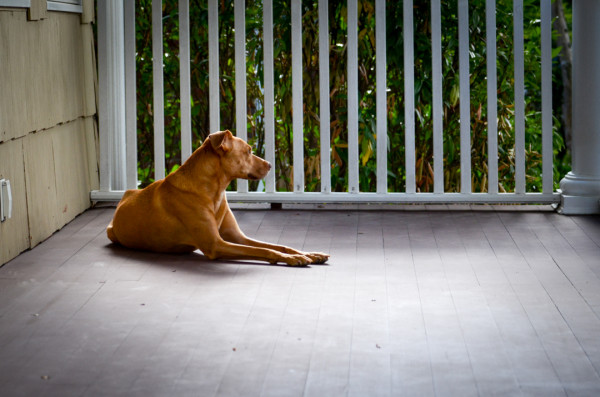
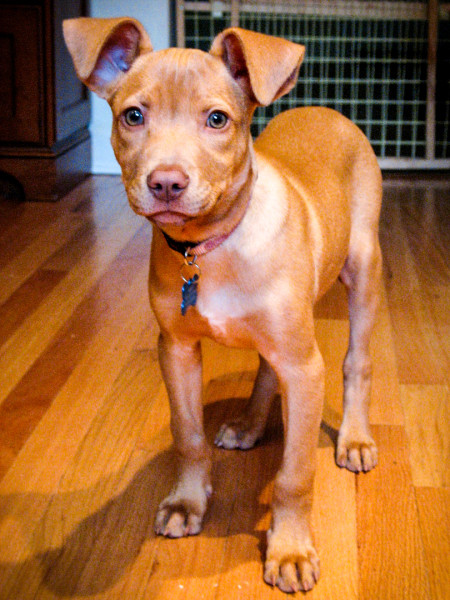
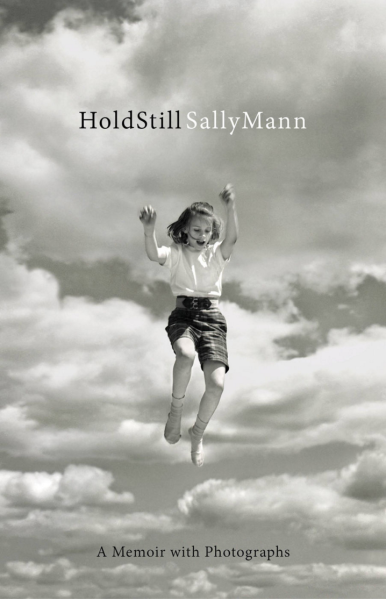
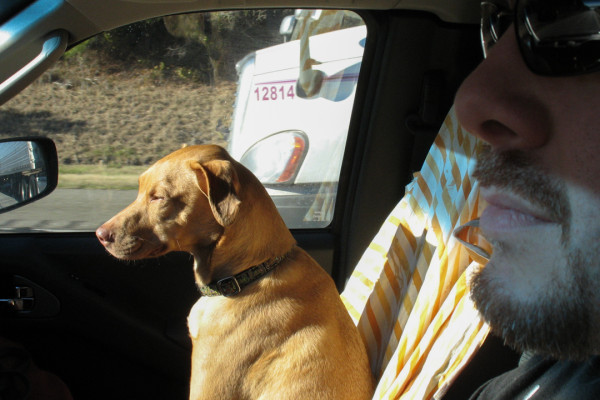
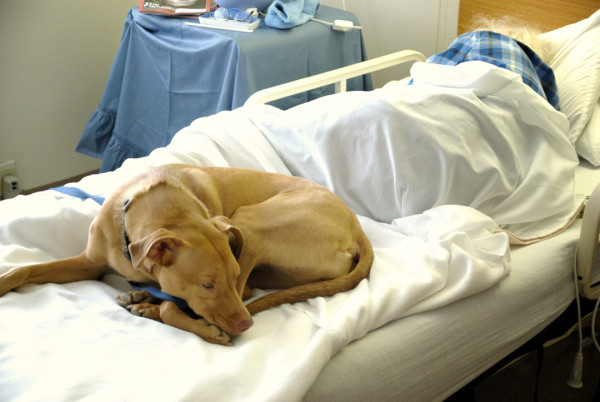
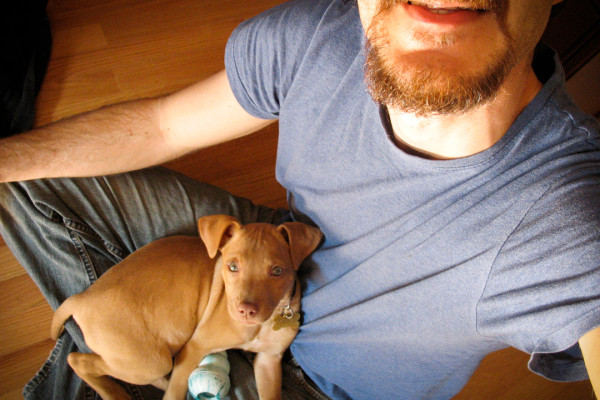
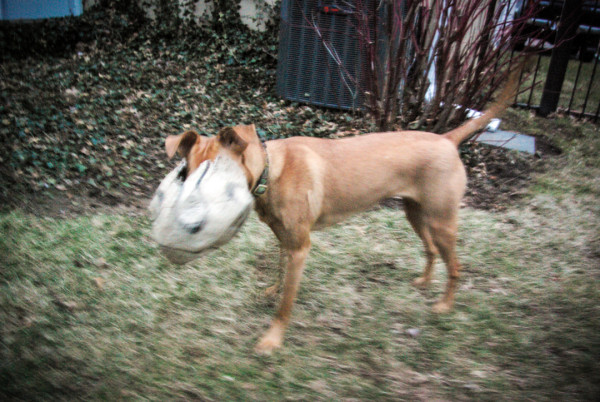
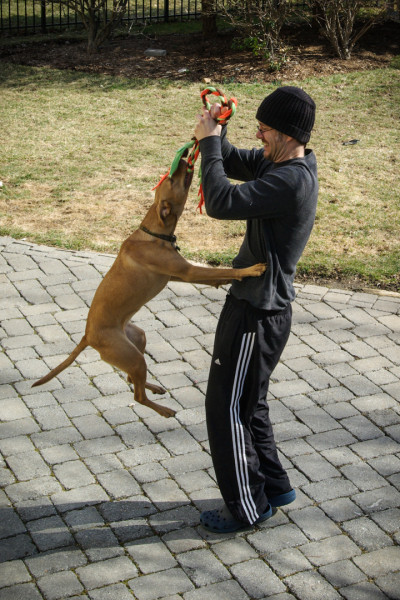
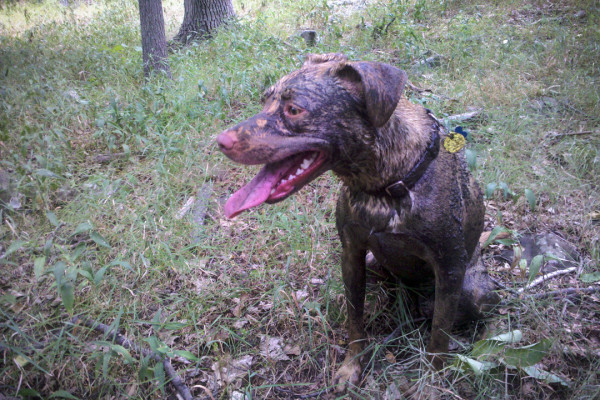
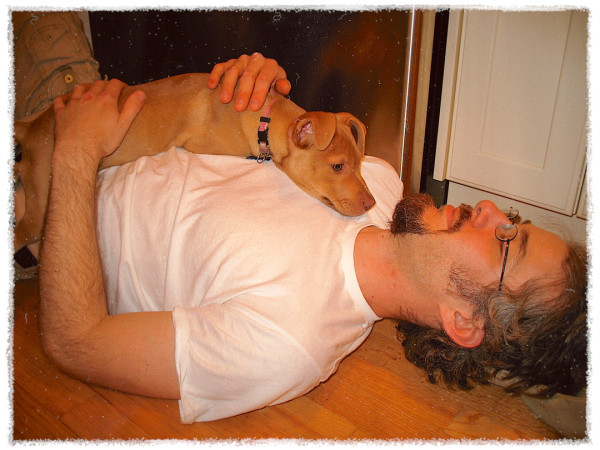
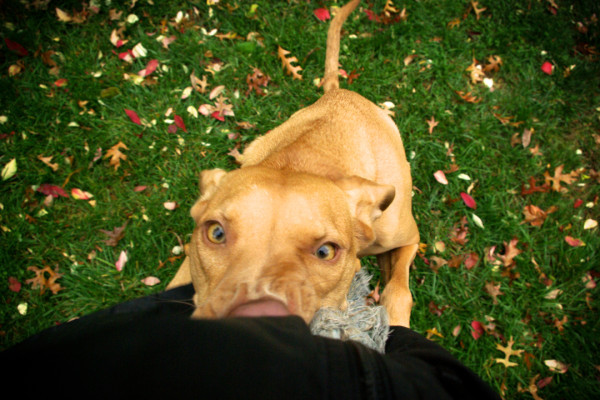
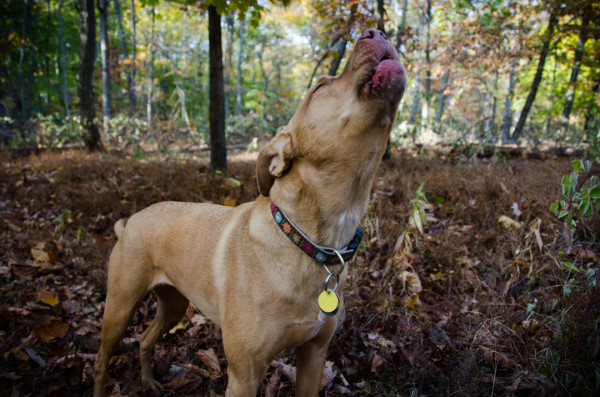
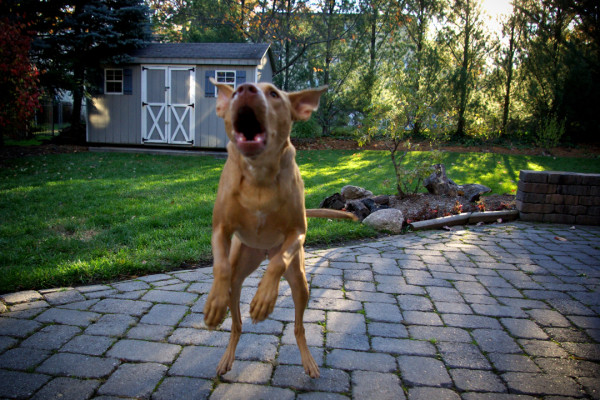
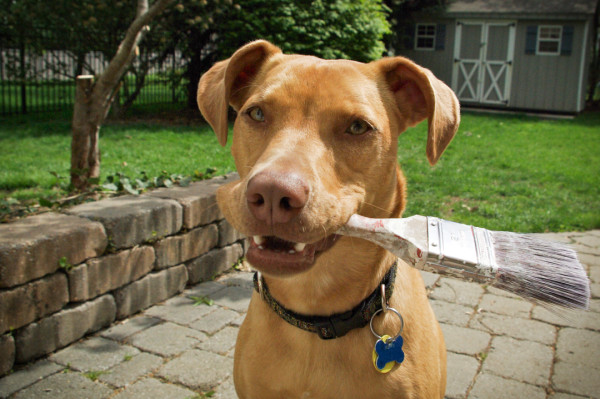
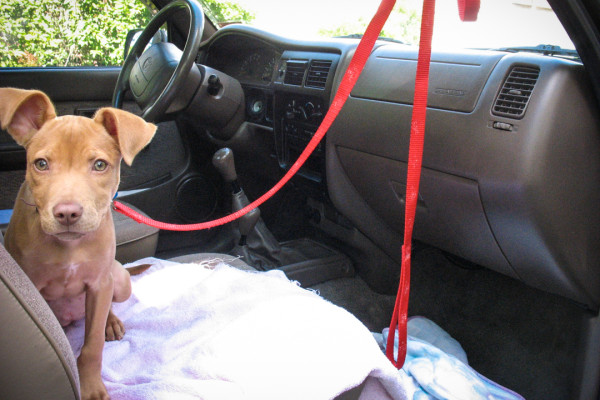
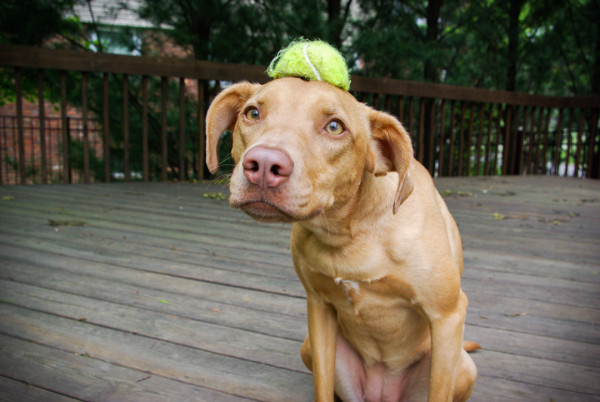
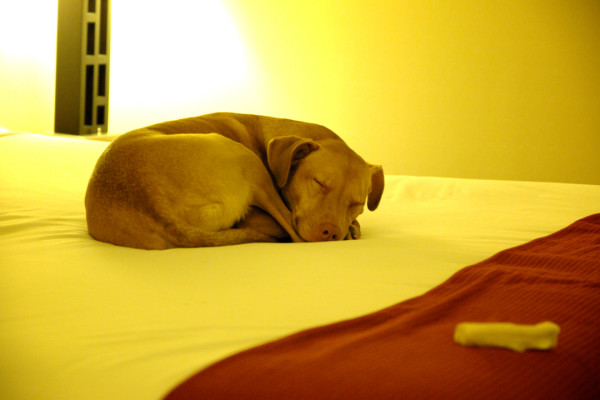
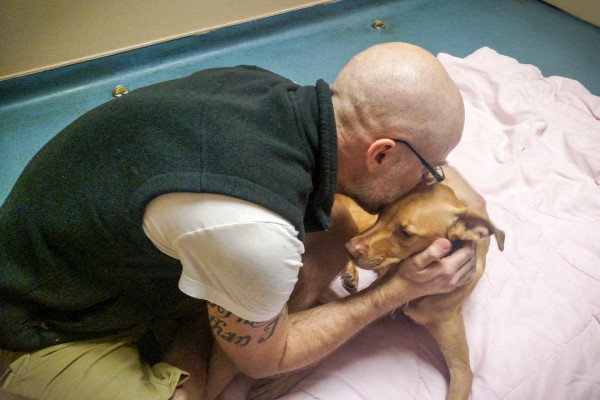
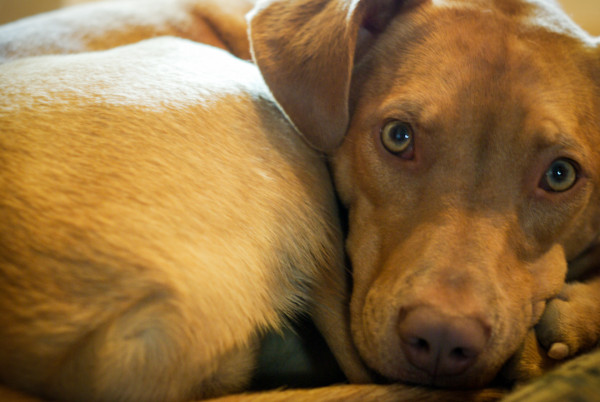
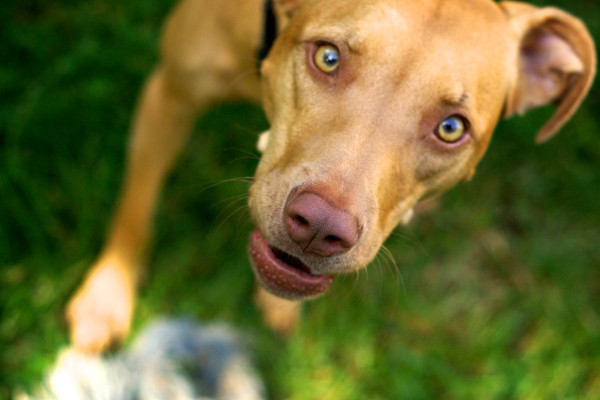
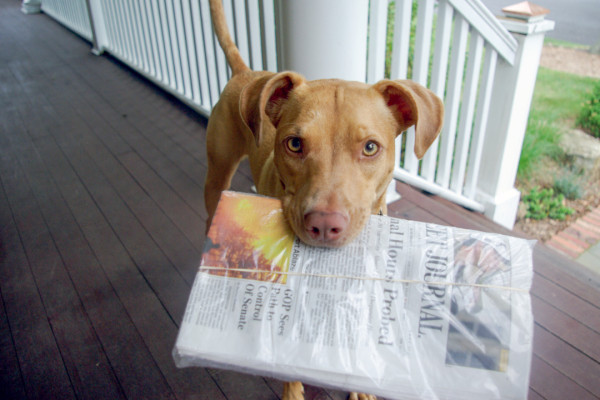
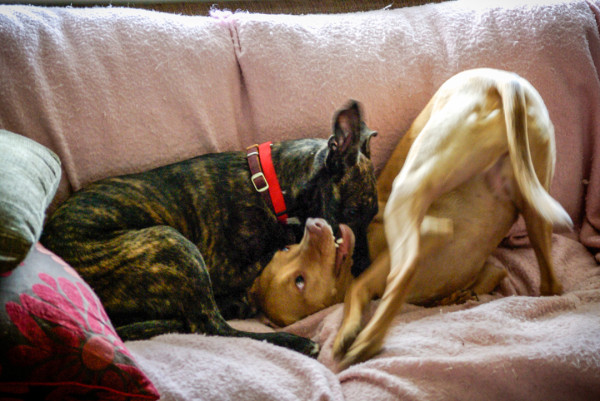
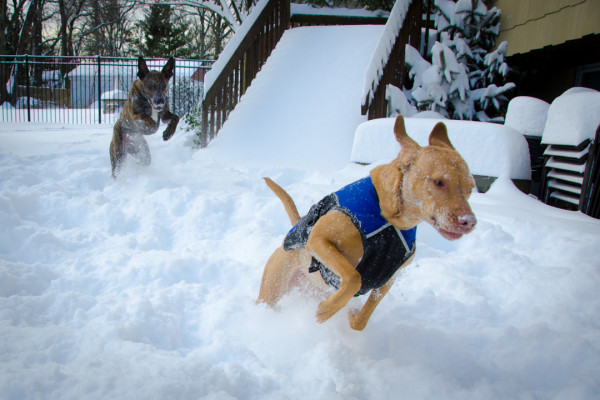
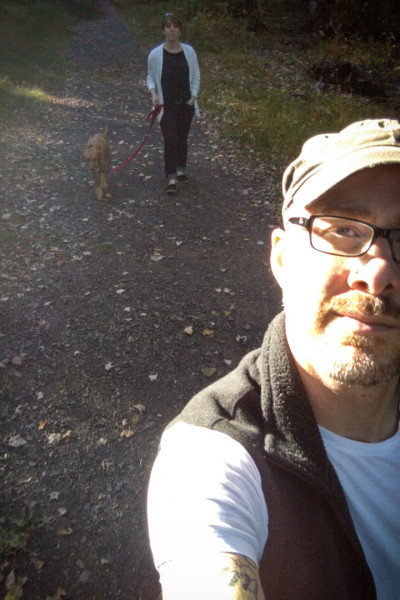
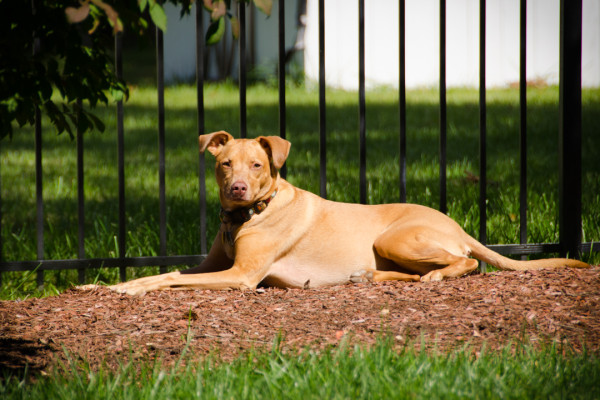
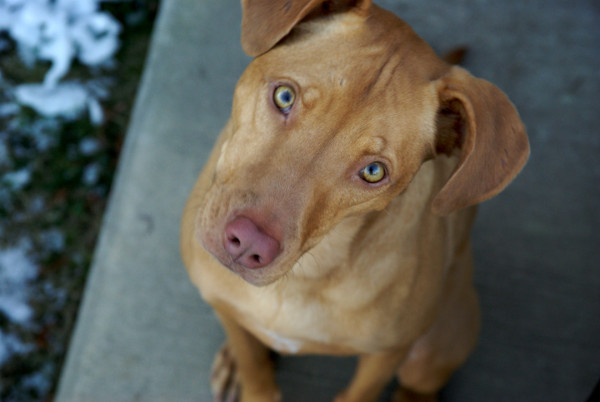
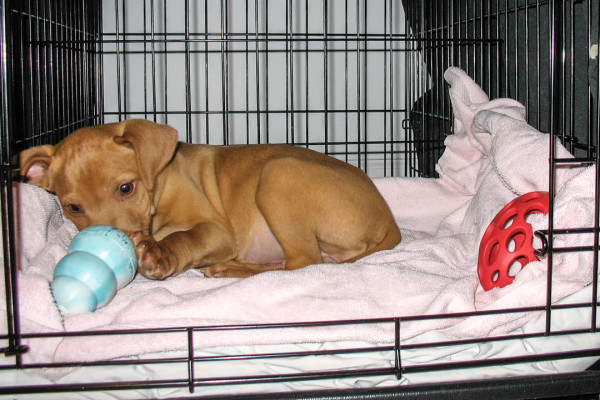

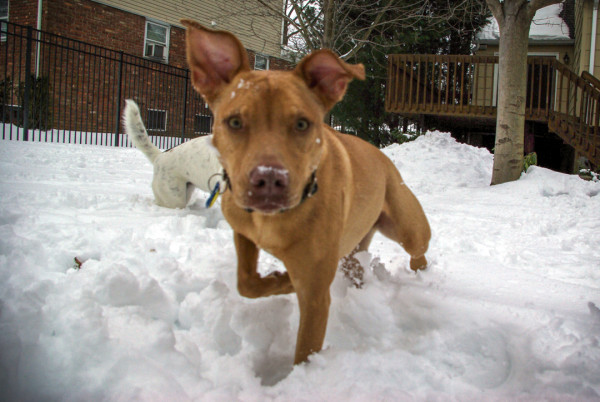
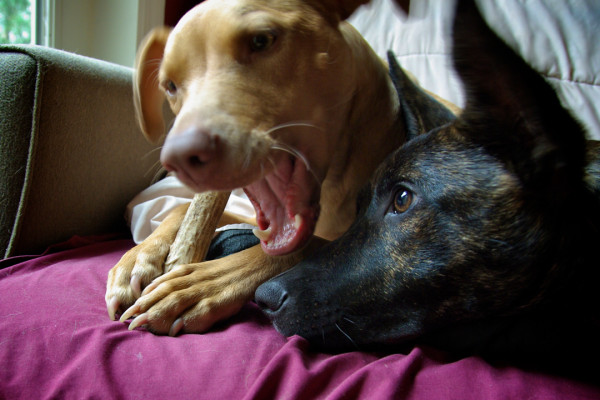
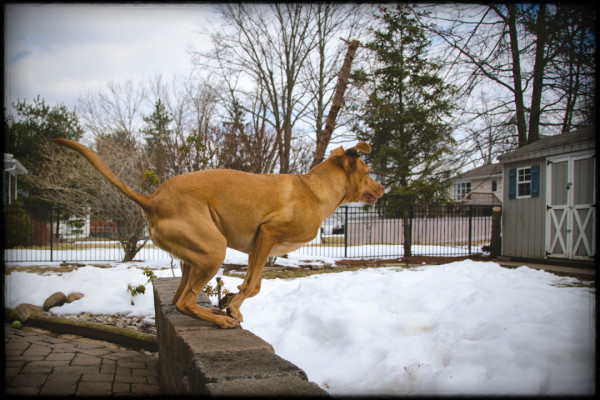
Wow David – what an amazingly powerful and touching piece. You relayed so many emotions so vividly. There is so much more I want to say, but the tears are blurring my vision. You put into words so much if what I feel for my own dog. Excellent piece – thank you for writing and sharing it.
Faye
Thanks, Faye, for reading. xoxoox
I started today like most days, begrudgingly dragging my body from the bed, dogs, set up breakfast things for mom, etc. and then I started scrolling through my Facebook posts. I scrolled through the adventures of daily woes and Elf on a Shelf adventures until I got back to a post I had seen the other day, but did not have the time read. It was this post with Honey’s beautiful face. As always it invited me in to “sniff” around at your writing. ( You are an excellent writer and I’m glad Honey helped you find your voice. She also helped me find your voice) as I read, I too found myself flooded with emotions(dogs past and present, my own experiences with loss -canine, feline,human) I went from my eyes welling up to full-on boogie/tear crying jag. I guess we emotional folks are both blessed and cursed. We feel both great love and great loss, sometimes simultaneously.
thank you for a beautiful writing….. you are a very special guy… love you Cuz
Beautiful, painful words.
Your writing touched my heart. Thank you for the courage it took to share your pain. The sun will always shine in the places where Honey would lie. What a sweetheart she was.
Thanks, Janice, for reading. 🙂
Thank you so much for sharing this, David.
xo….
Finally had the emotional strength to read this. So beautiful and so moving in what you both gave to each other. Thank you for sharing.
that was really beautiful, Dave. You found a voice through your dogs, that is true, but to truly honor Honey – you have to keep going. Keep writing, and putting it out there, as vulnerable as you are – for her.
Thanks, David. This brings back…a lot of feelings. Moms slowly passing out of our lives…our Alice going to the big sleep after a long and miserable bout with cancer that left her with three legs…siiiiiiigh. Thanks for being able to put the things into words that I’ve never been able. Also, I loved the hell out of that Sally Mann book–I didn’t want it to end
Great Scott, this Bald Man says most everything like this bald man would, if he could. Thanks David.
Ha! Thanks for reading, Don. 🙂
So true. We love dogs so much because they are part of us and who we are and when they pass a part of us pass along with them. But then something magical happens. You find yourself another best friend but this one won’t ever be honey. This one has a different purpose and meaning in your life and you grow even more. I feel that each dog I have fostered and taken care of and adopted have brought out things in me I never knew were there. One dog named pinto was a mess of a dog and he made me realize I need to become a certified trainer … They have these magical affects on us humans, man’s best friend , but it’s too bad not everyone sees and experience we what we have.
Indeed. While we end up with special bonds with some dogs, they all have something to teach us. 🙂